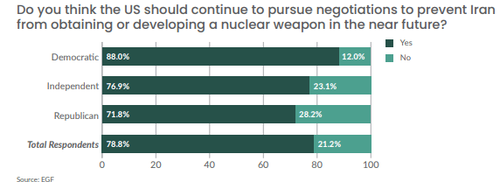
Authored by Kyle Anzalone & Connor Freeman via The Libertarian Institute,
According to a new survey of Americans, a growing majority desire negotiations with Washington’s enemies. For example, nearly 80% of people polled said they want the White House to continue nuclear talks with Iran.
The Eurasia Group Foundation released a new survey asking Americans if our government should negotiate with adversaries. Nearly twice as many Americans said they want more talks compared to those calling for less diplomacy.
Since Joe Biden became president, Washington’s relationship with Moscow, Beijing, Pyongyang and Tehran has become more contentious. However, the increasingly hostile White House is not reflective of the American public. Year-over-year the poll shows an increase in Americans favoring diplomacy over isolation.
The pollsters also found overwhelming support for negotiations with Iran. When asked, "Do you think the US should continue to pursue negotiations to prevent Iran from obtaining or developing a nuclear weapon in the near future?" 78.8 of Americans said yes, including over 70% of Republicans.
Biden campaigned on engaging Tehran and returning to the nuclear agreement that President Barack Obama helped create. President Donald Trump illegally exited in 2018.
The Biden White House has largely adopted the hardline position of the Trump administration, expanding the “maximum pressure” campaign, piling on additional sanctions, and preventing the US from reentering the nuclear deal.
On Russia-Ukraine, the poll found that "Avoiding a direct war between the US and Russia was the highest ranked goal across all party affiliations. This was followed by preventing the suffering of the Ukrainian people."
While Americans prefer engagement with adversaries, politicians in Washington largely advocate for an isolationist path Republican Senator from North Carolina Thom Tillis recently said talking with Iran was ill-advised. Democratic Senator Bob Menendez is a well-known Iran hawk and has repeatedly expressed his opposition to a diplomatic agreement with Tehran.
Authored by Kyle Anzalone & Connor Freeman via The Libertarian Institute,
According to a new survey of Americans, a growing majority desire negotiations with Washington’s enemies. For example, nearly 80% of people polled said they want the White House to continue nuclear talks with Iran.
The Eurasia Group Foundation released a new survey asking Americans if our government should negotiate with adversaries. Nearly twice as many Americans said they want more talks compared to those calling for less diplomacy.
Since Joe Biden became president, Washington’s relationship with Moscow, Beijing, Pyongyang and Tehran has become more contentious. However, the increasingly hostile White House is not reflective of the American public. Year-over-year the poll shows an increase in Americans favoring diplomacy over isolation.
The pollsters also found overwhelming support for negotiations with Iran. When asked, “Do you think the US should continue to pursue negotiations to prevent Iran from obtaining or developing a nuclear weapon in the near future?” 78.8 of Americans said yes, including over 70% of Republicans.
Biden campaigned on engaging Tehran and returning to the nuclear agreement that President Barack Obama helped create. President Donald Trump illegally exited in 2018.
The Biden White House has largely adopted the hardline position of the Trump administration, expanding the “maximum pressure” campaign, piling on additional sanctions, and preventing the US from reentering the nuclear deal.
On Russia-Ukraine, the poll found that “Avoiding a direct war between the US and Russia was the highest ranked goal across all party affiliations. This was followed by preventing the suffering of the Ukrainian people.”
While Americans prefer engagement with adversaries, politicians in Washington largely advocate for an isolationist path Republican Senator from North Carolina Thom Tillis recently said talking with Iran was ill-advised. Democratic Senator Bob Menendez is a well-known Iran hawk and has repeatedly expressed his opposition to a diplomatic agreement with Tehran.







